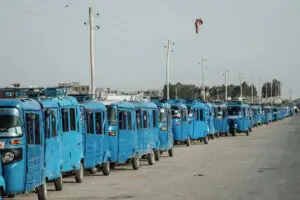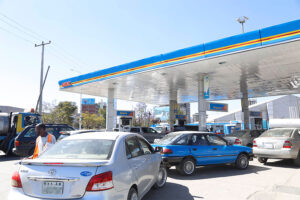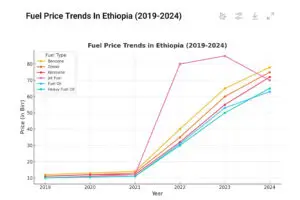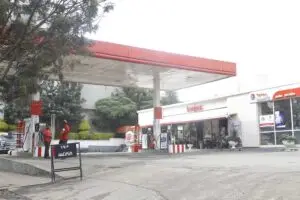Operational Inefficiencies in the Ethiopian Gas Station Industry
In Ethiopia, the gas station industry serves as the backbone of transportation, agriculture, and commerce. However, despite its importance to the nation’s economy, the sector is plagued by a variety of operational inefficiencies that hinder its ability to meet growing demand and deliver reliable services. These inefficiencies not only disrupt daily operations but also inflate costs, reduce profitability, and impede the sector’s overall growth potential.
In this blog post, we’ll delve into the root causes of operational inefficiencies in Ethiopia’s gas station industry and explore actionable solutions to overcome these challenges.
1. Inconsistent Fuel Supply
One of the most visible inefficiencies in the Ethiopian gas station industry is the inconsistent supply of fuel. Many gas stations frequently run out of stock due to delays in delivery, poor inventory management, and logistical bottlenecks in the fuel distribution network.
Key Issues:
- Dependence on imported fuel exposes the market to global supply chain disruptions.
- Limited storage capacity at gas stations means they cannot stockpile enough fuel to meet fluctuating demand.
- Inefficient transport systems—such as delays in road tanker deliveries—cause interruptions in supply chains, especially in rural areas.
Impact:
This inconsistency frustrates customers, creates long queues at gas stations, and forces some businesses to halt operations temporarily, resulting in economic losses.
2. Lack of Modern Technology
The gas station industry in Ethiopia is lagging behind in the adoption of modern technology, which limits operational efficiency and customer satisfaction.
Key Issues:
- Most gas stations rely on manual processes for inventory management, sales tracking, and customer service.
- A lack of digital payment systems forces customers to rely on cash, slowing transactions and increasing security risks.
- Fuel pumps and dispensing equipment are often outdated, leading to inaccurate measurements and increased maintenance costs.
Impact:
Without modern technology, gas stations face inefficiencies in daily operations, higher operational costs, and an inability to compete with more technologically advanced markets.
3. Inefficient Workforce Management
While gas station employees play a critical role in ensuring smooth operations, poor workforce management often leads to inefficiencies.
Key Issues:
- Limited training for employees on fuel safety, customer service, and modern management practices.
- Lack of structured schedules and performance monitoring, resulting in slow service and unnecessary delays.
- High employee turnover due to inadequate wages or poor working conditions, disrupting station operations.
Impact:
Poorly managed workforces contribute to long wait times, subpar customer experiences, and higher operational costs due to frequent staff replacements.
4. Fuel Subsidy Challenges and Mismanagement
The Ethiopian government’s subsidization of fuel prices is intended to make fuel more affordable for consumers. However, these subsidies often lead to operational inefficiencies at gas stations.
Key Issues:
- Delays in subsidy reimbursements from the government to gas station operators create cash flow issues.
- Fuel smuggling and black market sales distort supply chains, leading to shortages at legitimate stations.
- A lack of transparency in the subsidy system leads to misallocation of resources and inefficiencies in distribution.
Impact:
Fuel subsidies, while well-intentioned, often lead to financial strain for station owners and disrupt the fair distribution of fuel across the country.
5. Infrastructure Limitations
Gas station infrastructure in Ethiopia has not kept pace with the country’s economic growth and increasing fuel demand.
Key Issues:
- Many gas stations are outdated and lack essential facilities like restrooms, convenience stores, or maintenance services, which are standard in modern gas stations.
- Insufficient fuel storage capacity at stations results in frequent stockouts.
- Poor road infrastructure in rural areas delays fuel delivery and limits access to underserved regions.
Impact:
Limited and outdated infrastructure reduces the profitability of gas stations and fails to meet the expectations of an evolving customer base.
6. Limited Expansion into Rural Areas
While urban centers like Addis Ababa enjoy a relatively high density of gas stations, rural areas remain significantly underserved.
Key Issues:
- High transportation costs and logistical challenges make it difficult to establish and operate gas stations in remote areas.
- Lower fuel demand in rural regions deters investment, despite the growing need for agricultural and transport fuel.
- Limited government support for rural gas station development exacerbates the problem.
Impact:
The lack of rural gas stations stifles economic growth in Ethiopia’s agricultural and transport-dependent regions, creating a significant fuel access gap.
Solutions to Address Operational Inefficiencies
While the challenges are significant, the Ethiopian gas station industry has immense potential for improvement. Here are some strategies to address operational inefficiencies:
1. Modernize Infrastructure and Technology
- Invest in advanced fuel dispensing equipment and digital payment systems to streamline operations.
- Use Gas Pro software for managing your gas station.
2. Improve Workforce Training
- Provide employees with regular training on customer service, fuel safety, and modern management practices.
- Implement structured work schedules and incentivize performance to boost employee retention.
3. Expand Storage and Distribution Networks
- Increase storage capacity at gas stations and depots to ensure uninterrupted fuel supply.
- Invest in rural fuel stations and decentralized distribution points to bridge regional disparities.
4. Enhance Government Policies
- Introduce transparent subsidy systems and faster reimbursement processes.
- Strengthen regulations to curb fuel smuggling and black market activities.
5. Embrace Sustainability
- Integrate renewable energy solutions, such as solar-powered pumps and EV charging stations, to future-proof operations.
- Adopt environmentally friendly practices to reduce pollution and comply with global standards.
The Road Ahead
The Ethiopian gas station industry stands at a crossroads. While operational inefficiencies have long hindered its growth, there is an incredible opportunity to transform the sector into a modern, efficient, and customer-focused industry. By addressing supply chain issues, embracing technology, and investing in infrastructure and workforce development, Ethiopia can unlock the full potential of its gas station network.
For stakeholders, from government regulators to private investors, the time to act is now. Modernizing the industry isn’t just about keeping the pumps running—it’s about fueling Ethiopia’s future.
Do you operate a gas station? You can use Gas Pro, the first gas station management software in Ethiopia, to get these benefits:
Automated Tank Monitoring
Using Gas Pro, you can automatically measure your tank at the press of a button. This saves you time while increasing your measurement accuracy
Real-Time Fuel Level Alerts
Gas Pro will give “low fuel alerts” when the fuel reaches critical level and “fuel tank full” alerts when they fill up. This enables gas station owners and managers to coordinate supply of fuel.
Theft and Loss Prevention
Gas Pro’s dual-level sensors detect theft or tampering, reducing financial losses. Accurate records of fuel deliveries prevent disputes with suppliers.
Remote Pricing Control
Gas Pro enables you to remotely adjust the prices on your gas pumps thus increasing your ability to react to price changes made by the government.
More Stories

Operational Inefficiencies in the Ethiopian Gas Station Industry
Manual dipstick measurements and inventory tracking are labor-intensive, error-prone, and time-consuming. These methods often result in inventory discrepancies, which can lead to financial losses and operational disruptions.

Keeping the Pumps Running: Tackling Supply Chain Challenges in Ethiopia’s Fuel Market
Fuel is the lifeblood of any economy, powering everything from transportation and agriculture to industrial production. In Ethiopia, a nation undergoing rapid growth and development, the demand for fuel is rising steadily. Yet, ensuring a consistent and affordable fuel supply remains a formidable challenge.

From Addis to Rural Ethiopia: Bridging the Fuel Access Gap
Bridging the fuel access gap between Addis Ababa and rural Ethiopia will require concerted efforts from all stakeholders, from government officials to private investors. With the right policies, infrastructure investment, and technological innovation, Ethiopia can ensure that all its citizens—regardless of where they live—have equal access to the fuel they

The Future of Fuel: Opportunities and Growth in Ethiopia’s Gas Station Market
Ethiopia’s gas station market is at the cusp of transformation, and for those looking to invest, the future offers plenty of opportunities to drive growth and innovation. Whether you’re an entrepreneur looking to build your brand or an investor seeking profitable ventures, this is a sector worth watching.

Rising Prices, Rising Challenges: Navigating Fuel Costs in Ethiopian Gas Stations
Fuel prices are a central concern for gas station owners, operators, and consumers across Ethiopia. As a country that imports the majority of its petroleum products, Ethiopia is highly sensitive to global oil price fluctuations, foreign exchange availability, and government-imposed pricing regulations.

Fueling Ethiopia: How Government Policies Shape the Gas Station Industry
The gas station business in Ethiopia plays a pivotal role in keeping the country’s economy moving. From fueling vehicles to powering machinery, the availability and pricing of fuel impact everything from transportation costs to consumer goods.
